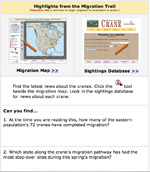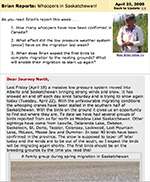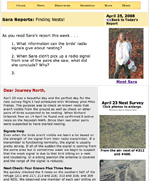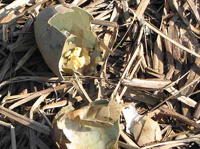Today's Report Includes:
- The Migration : Map, Data and Highlights >>
- Field Reports: The Home Stretch >>
- IMBD: Get Banded at Disney's Animal Kingdom >>
-
Links: This Week's Crane Resources >>
Guess
who's home? >>
Photo
Eva Szyszkoski, ICF
|
Maps
and Data
|
||
|
Arrival Log >> |
Map Questions >> |
|
| Highlights | ||
|
Western Flock: Brian Johns reports lots of sightings in Canada! He expects the first cranes to reach the nesting grounds in Wood Buffalo National Park any day now. Do any whoopers remain in Texas? Tom Stehn will fly over Aransas NWR on May 1 to find out. Eastern Flock: Nine more members of the Class of 2007 reached the finish line in Wisconsin this week, including the lone #703. TEN pairs are nesting! ICF Tracking Crew Chief Anna Fasoli reports, "Still unaccounted for are #727, 733, 706, 712, and 713. We will be listening for them to pass over the refuge in the next few days." DAR 40-07 is in Indiana and five other 2007 DAR birds are in Michigan.
|
||
|
||
|
Read
>> |
Read
>> |
|
|
Western Flock Report: Thanks to snowy weather grounding the cranes last week, as many as 50 cranes were accounted for. Biologist Brian Johns reports from the home stretch of the migration route in Canada! >> Eastern Flock Report: Sara took to the skies to search for treasured Whooping Crane nests. What happy discoveries did she make? >> |
||
Most whooping cranes are born and raised in the wild, but the ultralight-led chicks are raised in captivity by costume-clad humans. How do the lives of these chicks compare? Our slide show covers these questions:
- How are the chicks' nests the same? How are they different?
- How does each type of chick learn who its parents are and what species it belongs with?
- How do both types of chicks learn to find food?
- How do both types of chicks learn where to roost?
- How does each type of chick learn to migrate?
As you compare their stories, use the Handout or your journal to write down your ideas.

Slide Show >>
Human babies don't come with instructions, and whooping crane eggs don't, either. How is a new parent supposed to know what to do? Parenting takes practice, and beginners — whether whooping cranes or humans — sometimes make mistakes.
Broken eggs often happen with inexperienced birds, but experts know that cranes learn from their mistakes. What might have happened to these eggs, laid recently by #416 and #209? More >>IMBD stands for International Migratory Bird Day. Big celebrations are held each May. For example, at Disney Animal Kingdom all the kids who migrate through on IMBD get "banded." What bird decorates this year's bands?

Operation Migration, the folks who train and conduct the ultralight-led migration of most whooper chicks in the Eastern flock, brings an ultralight plane and their team to talk about OM's work and their partnership with Disney. If you're in the area, don't miss this exciting event!
The Next Whooping Crane Migration Update Will Be Posted on May 2, 2008.










